 |  |
By Tom Gatch
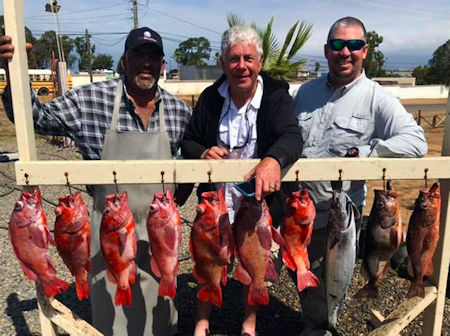
For some reason, it seems like we tend to get some of our best weather during the months of fall, long after the tourists have returned home; and that often applies to the fishing as well. This year has been no exception, with banner yellowtail fishing as well as offshore bluefin and yellowfin tuna, along with an occasional dorado.
Anglers out of sportfishing operations on boats heading south to the Coronado Islands from San Diego looking for surface action close to home have been treated to a mixed bite of large, aggressive skipjack and somewhat smaller, football size yellowfin tuna. Most of the fish have attacked hard baits on the troll.
Down the coast a bit, working out of the municipal marina in Ensenada, Capt. Louie Prieto from It’s 4 Reels Sportfishing says that he does not have to take his clients very far to find good fishing these days. Prieto offers, “The fishing has been very steady. Yesterday, we were out there throwing the iron and took more than 15 quality grade yellowtail. We also nailed a few nice calicos; and I lost count of how many barracuda we caught. We got them all less than 5 miles from the marina.”
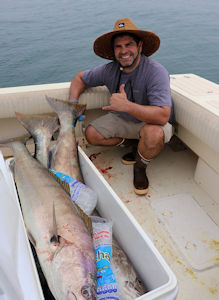
Castro’s Fishing Place, also referred to as Castro’s Camp by longtime Baja anglers, has been a prized resource for anglers in search of world class bottom fishing for decades. Lately, however, Fernando Castro’s boats have also been enjoying a wide-open bite on yellowtail, as well as the usual reds, lings, and chuckleheads.
At the southern end of Bahía de Todos Santos, Vonny’s Fleet in Punta Banda reports some exceptional fishing for chunky Pacific red snapper and other bottom fish, along with big bonito up to 10 pounds and occasional yellowtail closer to the surface.
Although there have been a few skipjack and yellowfin tuna taken, along with occasional flurries of hungry yellowtail down at Castro’s Fishing Place in Erendira, the most consistent action remains the many plentiful bottom fish that Castro’s has become famous for that provide a smorgasborg of tasty deep water denizens from lingcod and reds to a variety of other rockfish along with some nice sized California sheepshead.
Further south in Bahía San Quintín, Capt. Juan Cook reports that he and his customers have been having a field day catching huge white seabass, some of which have weighed well over 50-pounds and end up yielding a bounty of boneless gourmet quality fillets. Capt. Kelly Catian at San Quintín’s K&M Sportfishing confirms that he has also been hooking his clients up with the huge seabass, and added that one of them also took a fat broomtail grouper recently, which is rare because these fish are usually only found in more southerly waters.
Just off Baja’s central Pacific coast, anglers visiting Cedros Island have been bending their rods on a wide variety of popular gamefish that include hard fighting yellowtail up to 53 pounds, quality grade halibut over 20 pounds, trophy sized calico bass up to 10 pounds, large ocean whitefish weighing 6 pounds or more, a few nice broomtail grouper, and even a black sea bass that weighed out at 109 pounds.
Charlie Osaki, and his fishing buddy, Mark Sirof, from Orange County were on their second trip to the Island with Cedros Outdoor Adventures, and experienced the fishing trip of a lifetime. They reported catching daily limits of yellowtail on blue & white surface iron, as well as one huge 45 pound forktail in only about 15 feet of water.
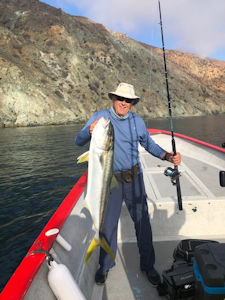
Osaki relates, “I was using a live mackerel and 30-pound test fluorocarbon leader on a Daiwa 300 Lexi, and Phenix M1 rod. The yellowtail took the live mackerel, ran up the beach, and then suddenly took off for the channel, where we finally gaffed it in 375 of water; over a quarter mile off the shore.”
Down near the tip of the peninsula in Cabo San Lucas, Pisces Sportfishing reports, “Fall is just beginning, yet there are truly no words for the epic fishing we had last week. There were 147 billfish released by 36 boats; that’s an average of 4 billfish per boat, we also had quite a few blue marlin between 300 and 500 pounds.
We have also have had good dorado fishing recently, and 237 just last week. Some of the fish were a very good grade, which made it easy to pick and choose which ones you wanted to catch and take home. For example, our top dorado boat, Pisces 28’ Andrea, caught 22 Dorado in one day, with two anglers on board. They only kept fish that averaged between 20 and 30 pounds.”
They concluded their report by offering, “Now for the tuna… only 8 of our boats targeted tuna last week, but boy did it pay off. The 4 largest yellowfin tuna caught were a 68 pounder, 118 pounder, 164 pounder along with a mammoth 286-pound cow!”
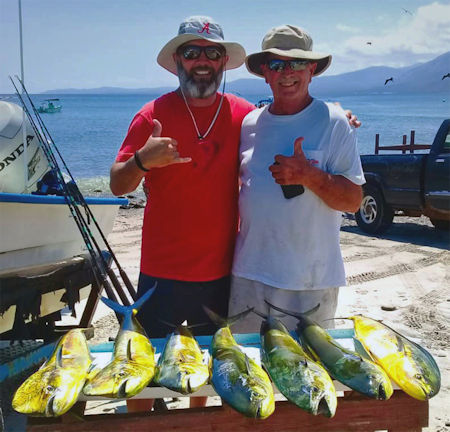
Around the corner in San Jose del Cabo, Eric Bricston at Gordo Bank Pangas indicated, “Ocean water temperature is now in the 82 to 84-degree range, still favorable for storm activity. Weather is now very tropical, can be unpredictable, presently we are watching a new low-pressure area forming near Acapulco, which has a good chance to become Tropical Storm Narda, we will watch what happens with this in coming days. With limited numbers of anglers in town, most charters were now fishing the grounds from Iman to Vinorama. Sardinas were found off the beach stretches north of Vinorama for the first part of the week before scattering, over the weekend the bait vendors searched for sardinas schooling back near the marina jetty.
The all-around action was spotty through much of the week, as water conditions had turned over and were off colored, also there was a very strong current sweeping through. As the week progressed conditions rebounded and reports were much better for the weekend. Yellowfin tuna and dorado were the most common species, an occasional billfish or wahoo, also a mix of bottom dwellers.
Drift fishing with sardinas, strips of squid, chunks of skipjack or bolito was the main method for enticing the yellowfin, fish ranged in sizes from 15 to 75 lb. Bite was still a bit scratchy, but some charters did account for up to five tuna. Dorado numbers were down from how they had been, found in scattered schools, hard to find one much larger than ten lb., so many of the smaller dorado were released. With the strong currents running that did not help the bottom action, hard to stay down, fish do not like battling that either. We did see a few smaller amberjack, leopard grouper, yellow snapper, barred pargo, bonito and triggerfish.”
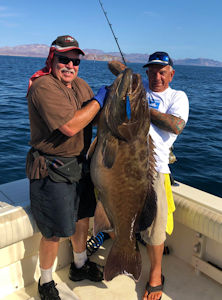
Further up the Cortez coast to the north, Jonathan Roldan at Tailhunter International offers,” “We are still recovering from Hurricane Lorena, which eventually reached category 1 status and came directly over La Paz instead of veering off as had been originally predicted. Fortunately, other than some heavy flooding, a few roads washing out and felling some trees and power poles, no one was injured and property damage was relatively minimal compared to other hurricanes that have blown through.
The fishing, as well, was heavily affected. Right after Lorena moved north, it caused tropical storm Mario, holding off the Pacific Coast to move into the vacuum. So, early in the week brought continued cloudiness, rough seas and occasional rainstorms. All of this caused the bite to take it’s time getting back up to speed.
Prior to the storm, we had the best dorado bite of the season going. We had the best marlin bite I have ever seen in over 2 decades. After Lorena, it took a while to gain momentum again.
Last week started pretty scratchy, but with each progressive day the waters cleared up and the fish started to bite again. It wasn’t as much of a full-turbo bite that we enjoyed the week before, but fairly decent action kept improving with mostly dorado biting for both our Tailhunter La Paz and our Tailhunter Las Arenas fleets. Most of the dorado were respectable 10 to 20-pound fish, with a few larger ones mixed in.
Additionally, the action for both blue and striped marlin improved dramatically as well, with a good number of fish hooked each day while anglers were trying to catch dorado.
There are still no tuna or wahoo to speak of, although this should actually be prime-time for both species. Occasionally, one or two tuna are getting picked up, but the schools are either moving too fast or pop up and boil, then quickly go back down. On several occasions, the fish were boiling but refused to take baits. Checking the stomachs of several hooked tuna, we found their bellies full of small squid which could account for their unwillingness to take a hooked bait.”
Roldan ended his report by adding” As for other species, the change in weather seems to have a dramatic effect on other species as well. It’s almost as if we are fishing in June conditions again. We’re getting pargo, cabrilla, jack crevalle, the occasional yellowtail and amberjack, pompano and even some sierra plus those big dog-tooth snapper again.”
Up near the northern end of the Sea of Cortez, anglers out of Bahia de Los Angeles continue to score well on big yellowtail weighing 25 pounds or more and a variety of groupers that range in size from fat to giant.
When you realize that all of these great opportunities to enjoy a fantastic fishing adventure are still available to visitors during the fall season, if you aren’t already planning to escape on a Baja getaway during the next few months, you might want to ask yourself why.